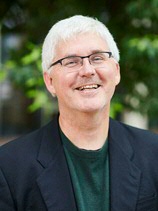Fallout from coronavirus outbreak triggers 25% decrease in China's carbon emissions |CBC interview with Klaus Hubacek
'In terms of the absolute volume of emissions, this is absolutely unprecedented,' researcher says
'De-coupling' growth from carbon
The entanglement of economic activity and carbon emissions is one of the most vexing aspects of climate change mitigation.
For years, experts have debated how to separate growth from carbon emissions, a concept known as de-coupling.
"The economy grows, the emissions grow, unless we have decoupling," said Hubacek, whose research has shown that reducing carbon emissions in one country often results in a shift of carbon-intensive production to another country.
The task is also complicated by the challenge of lifting much of the world out of poverty while trying to reduce emissions. Hubacek points out that half of the world's population is still living on $3 a day.
Some academics are also studying the concept of degrowth, a school of thought where economic activity is deliberately reduced to slow climate change. The research is geared toward policies that would gradually scale back economic growth to the point where it's in sync with global resources. The idea is to use local resources and change the way people work so that less time is spent on economically oriented activity.

"I find it quite sympathetic and interesting but it's really, within academia, a niche. I don't think it has any political traction at this point," said Hubacek (Energy and Sustainability Research Institute Groningen, ESRIG).
More information
| Last modified: | 01 August 2022 2.49 p.m. |
More news
-
21 May 2024
Results of 2024 University elections
The votes have been counted and the results of the University elections are in!
-
13 May 2024
Trapping molecules
In his laboratory, physicist Steven Hoekstra is building an experimental set-up made of two parts: one that produces barium fluoride molecules, and a second part that traps the molecules and brings them to an almost complete standstill so they can...
-
29 April 2024
Tactile sensors
Every two weeks, UG Makers puts the spotlight on a researcher who has created something tangible, ranging from homemade measuring equipment for academic research to small or larger products that can change our daily lives. That is how UG...
